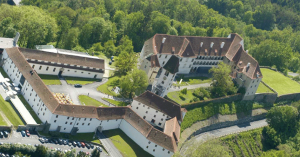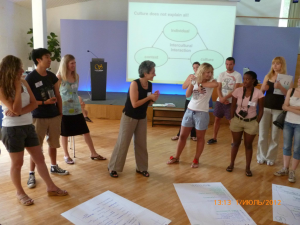During June / July 2012 Makwena Seshoka attended the International Summer School Seggau, here is her story.
Pre-departure:
My excitement started when I noticed the call for Summer School applications on the Postgraduate & International Office webpage! I was excited about the prospect of travelling to and studying at another European university. I have always wanted to travel to Austria and this was my opportunity and I grabbed it with both hands. I felt very privileged and honored to be selected to participate in the International Summer School Seggau. I selected the Society and Culture seminar, which focused on “European values” and “Education and the Reproduction of Privilege: Leadership at the intersection of Gender, Class and Ethnicity”. This particular seminar interested me because of its alignment with my MPhil in Education and Training.

The excitement was followed by intense anxiety as I was going through the motions of the application process! However , the Summer School coordinator made the process easy and simple with his calm and composed manner , he was always available to assist with the application process, which was daunting at times.
Application process
Though at first sight the application process seems intimidating, the process is actually easy. Once you have established what the requirements are, one must make sure that they have all the information required on hand when making the actual application. The US application process is three phased; the application form, motivation letter and a video motivation (guidelines are available on the webpage).The summer school coordinator will notify applicants of their success, sponsorship and nomination to the summer school.
Your application is then forwarded to the host summer school for consideration .This process will be facilitated by the summer school coordinator while you wait anxiously for the answer! Should you be fortunate like and get selected, the online Graz information gathering process starts. Ensure that you familiarise yourself with what is required and keep them handy when sending the information , it can get technical ! You will need a passport size photo (digital), your passport number, date of issue and date of expiry etc. Like the US, Graz University officials are also very friendly and efficient, they are always ready and willing to offer assistance with any information you need.
Visa application
Luckily, you can make your application in Cape Town; previously, one had to travel to Pretoria to do that. To apply for a visa, you first need to make an appointment online. Before you do that though; you must have received a letter of confirmation from your host university, confirming that your application and sponsorship has been successful. Secondly, they will send you an invitation letter to be used for the visa application. Off we went to Cape Town, me and Nina, smiling and giggling all the way, also nervous about the visa application process. One never knows with Visas. We had all manner of documents on us, just to make sure that we do not jeopardize our chances of going to Austria! To ensure that your application runs smooth at the visa office, have the following with you:
- Visa application forms with two passport size photos
- travel insurance-issued by the insurer not medical aid
- Proof of financial resources – use confirmation of the US sponsorship and your financial statements
- reservation (NOT the booked ticket) of your travel- do not pay for the ticket yet because visa application is not guaranteed
Once the Visa is issued, you can safely pay your ticket and from then on, it’s A for away and you start reading for the Summer School, a wake up reality that you are not going on holiday! Shop around for a good deal on a ticket, smaller airlines offer value for money!
The Summer School
Mind blowing! The University of Graz Summer School is well organised. It is set in the most picturesque environment you can imagine, The Seggau Castle in Leibnitz, some 50 Kilometres from Graz is a 5 star establishment , with a giant swimming pool , good cafe lounge, a restaurant that serves the most fantastic food, a chapel and a cellar! You play hard and work hard! There are many activities to do in the Castle, planned and unplanned; movie evenings and sports tournaments etc., and many more that students arrange for themselves.
The academic programme was intense; we worked from 09h00 to 10pm with ample breaks in between though! The morning sessions started with a key note address delivered by various participating lecturers and guest lecturers. The talks were stimulating, focused on different views of the concept leadership, different types of leadership styles and leaders who led Europe over the centuries and their impact on the current Europe/s. The talks were also focused on the new type of leadership and leaders required for Europe in 21st century. Following were some of the topics covered during key note addresses:
- Connecting Cultures
- The future of Europe?
- Different concepts of leadership and unity in Europe
- The spiritual roots of European Leadership
It was interesting to learn about the history of the Balkan states and their current challenges. I understand better the challenges facing the EU , the complexities of the governance and legal frameworks .To succeed in leading the EU in the current period of crises , requires a different type of leaders able to gather leader/s capable of to overcoming the enormous task of building a prosperous, united Europe with its diverse peoples.

The key note addresses were followed by a facilitated session, where all students were divided into smaller groups to engage, debate and give own perspectives on the key note addresses. This was the most interesting part as students asked questions, different and sometimes agreeing on some of the perspectives. These sessions were characterized by vigorous arguments and endless fun.
After that, we will go to our respective seminars with our respective lecturers .Our seminar group was fourteen in total, comprising students from Russia, Ukraine, The Netherlands, China, Croatia, Albania, Austria and South Africa. The seminars ran for two weeks. The first week was dedicated to European values with Prof Moebuis of the University of Graz and the second week was the topic Education and the Reproduction of Privilege with Dr Karen Doolan of the University of Zadar – Croatia.
The difference between the summer school and a university programme is time. There is ample time during a semester to read and discuss articles and lectures .During a summer school, a lot of valuable information is scrammed into a week and that can be overwhelming. However, the energy, buzz and the enthusiasm of the participants makes up for limited time.
Return:
I was happy to return to Stellenbosch, back to reality! My trip to Austria confirmed my assertion that we have some of the best universities in the world .The quality of our lecturers and facilities rank high, something we can all be proud of. The quality of scholarship is different .The undergraduate social science European student is more knowledgeable than our undergraduate students. They are theoretically sound and are able to engage on various topics at a higher level than their counterparts in South Africa. I always enjoy the relative safety of European cities; one doesn’t have to worry much about petty crimes such as muggings, robberies and bicycle thefts etc. The European public transport system is well integrated and works like a well-oiled machine. The South African government has a massive task ahead them for improving the public transport system; we need the Gautrain everywhere in the country :).
I believe that Europeans can learn a lot from South Africa regarding smooth transition from a different exclusive political system to a new and inclusive political system; however, South Africa can also learn a lot about human rights and human dignity from Europeans. They also have their immigration challenges, but together we can learn a lot from each other. For some reason the trip made me appreciate more of what our country has gone through and how well we managed our situation and how many South African are working hard to make a difference under difficult economic difficulties. Many South African students can benefit a lot if they can travel overseas to learn first about the difficulties that others countries are going through. Although we have many challenges, we enjoy many freedoms that citizens of other countries can only wish for.
During my interaction with Professors from the University of Graz I was inspired by their passion and knowledge about global issues and their interest in South Africa. Their passion together with my interest in research made me think of a possible study partnership between my faculty and the education faculty of the University of Graz. It would be a great honour and privilege if I could be given another opportunity to return to Graz on a longer scholarship to learn more on Leadership and Education.
I had the most wonderful time of my life , met the most fantastic people and came back a better student and person !
